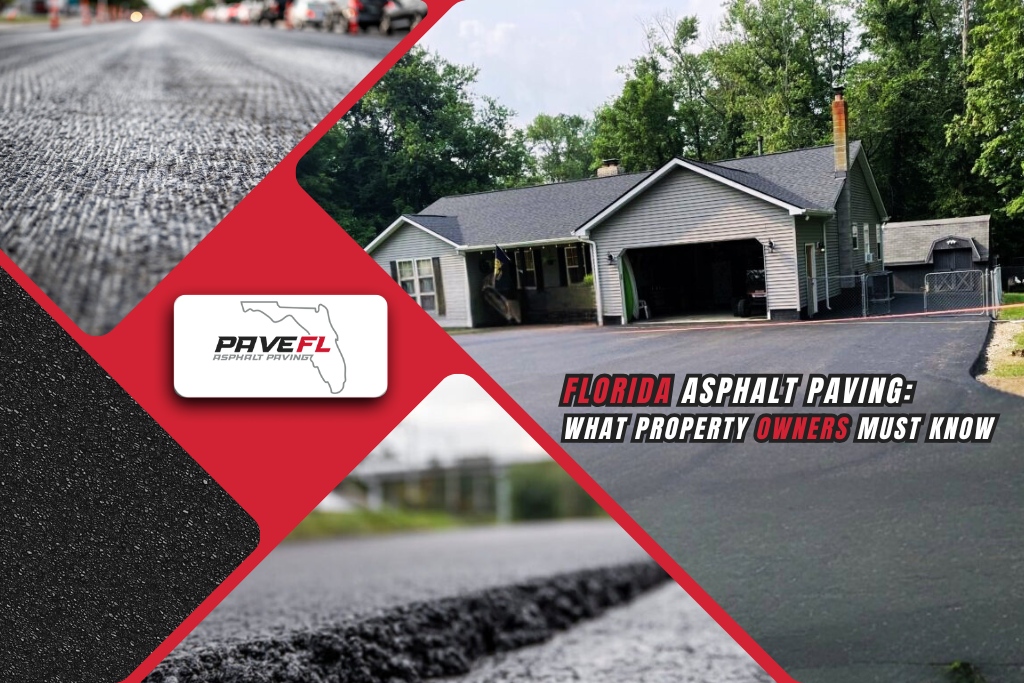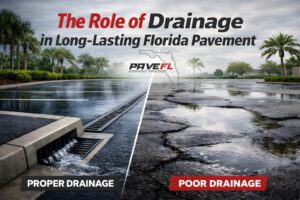
Are you planning for Asphalt Paving in Florida? Then you must know about the critical importance of Asphalt Expertise in Florida. Florida’s unique climate and soil conditions make asphalt paving a science that demands specialized knowledge. Property owners who underestimate these factors risk premature pavement failure, costly repairs, and safety hazards. With temperatures soaring above 90°F, annual rainfall exceeding 60 inches, and sandy soils prone to shifting, Florida’s environment is unforgiving to substandard paving work. Understanding asphalt’s behavior in these conditions isn’t just technical—it’s essential for protecting your investment. This guide equips you with actionable insights to ensure your driveway, parking lot, or roadway delivers decades of performance.
Why Asphalt Reigns Supreme in Florida
Asphalt’s dominance in Florida paving stems from its unmatched adaptability to the state’s challenges. Unlike concrete, which cracks under thermal stress, asphalt’s flexibility accommodates ground movement caused by Florida’s sandy soils. Its dark surface absorbs heat, accelerating rainwater evaporation and reducing the risk of hydroplaning during downpours. Modern asphalt mixes incorporate polymers that resist UV degradation and softening in extreme heat—critical for longevity in the Sunshine State. Additionally, asphalt’s 100% recyclability aligns with Florida’s environmental regulations, making it the sustainable choice for eco-conscious property owners.
The Unique Challenges of Asphalt Paving in Florida
1. Extreme Heat and UV Exposure
Florida’s subtropical and tropical climate means hot summers with average temperatures often exceeding 90°F. Intense sunlight and UV exposure accelerate oxidation in asphalt, causing it to fade, dry out, and eventually crack. Without proper sealcoating, pavements can lose flexibility and deteriorate quickly.
2. Heavy Rainfall and Stormwater
The rainy season in Florida lasts from May to October, bringing frequent downpours. Poor drainage can lead to standing water, which weakens the asphalt base and contributes to potholes. Property owners must ensure proper grading and drainage solutions, such as catch basins or French drains.
3. Hurricanes and Flooding
Hurricane season (June to November) presents additional risks. Flooding can wash out the sub-base, while storm surges and debris can physically damage paved surfaces. Asphalt that isn’t properly compacted or protected may suffer structural issues.
4. Sandy Soil and Sub-Base Issues
Florida’s sandy soils pose challenges for pavement stability. Without proper site preparation and base compaction, asphalt can shift, settle, or crack. Local expertise is crucial to address soil conditions and ensure long-lasting pavement.
5. High Traffic and Tourism Impact
Florida’s bustling tourism industry and growing population mean heavy traffic on residential and commercial pavements. Driveways, parking lots, and roads must withstand constant wear, especially in urban centers like Orlando, Miami, and Tampa.
Benefits of Asphalt Paving in Florida
Despite the challenges, asphalt remains the preferred paving material for Florida property owners due to its advantages:
- Durability: With proper installation and maintenance, asphalt surfaces can last 15–20 years in Florida conditions.
- Flexibility: Asphalt adapts better to minor ground shifts compared to rigid materials like concrete.
- Cost-Effectiveness: Lower initial costs than concrete, plus easier and less expensive repairs.
- Safety: Smooth surfaces improve driving comfort, while proper striping enhances visibility and compliance with ADA standards.
- Eco-Friendliness: Asphalt is 100% recyclable, and modern mixes use reclaimed asphalt pavement (RAP), reducing waste.
- Quick Installation: Asphalt projects can often be completed faster than concrete, minimizing downtime for businesses.
Key Considerations for Florida Property Owners
1. Choosing the Right Asphalt Mix
- Hot Mix Asphalt (HMA): Standard for most driveways and parking lots.
- Warm Mix Asphalt (WMA): Better for high-heat applications; produces fewer emissions.
- Porous Asphalt: Ideal for stormwater management, allowing water to filter through the pavement and reduce runoff.
2. Drainage Planning
A critical part of any Florida paving project is drainage. Contractors should grade the surface (usually 1–2% slope) to direct water away from pavements and buildings.
3. Sealcoating
Regular sealcoating protects against UV rays, oxidation, and water penetration. In Florida, sealcoating is typically recommended every 2–3 years.
4. Thickness and Base Preparation
- Residential driveways: 2–3 inches of asphalt over a properly compacted base.
- Commercial lots: 4–6 inches of asphalt, with a stronger base to handle heavy traffic.
5. Compliance with Local Regulations
Cities and counties in Florida have strict paving requirements. Contractors must follow stormwater management rules, zoning laws, and ADA accessibility guidelines.
Maintenance Tips for Florida Property Owners
1. Sealcoating Schedule
Apply sealcoat within the first year of installation, then reapply every 2–3 years. This extends pavement life and enhances appearance.
2. Crack Sealing
Address cracks immediately to prevent water infiltration, which can weaken the sub-base.
3. Pothole Repairs
Timely pothole patching prevents further deterioration and maintains safety.
4. Regular Cleaning
Remove debris, leaves, and standing water to prevent staining and surface damage.
5. Line Striping
For parking lots, restripe every 2–3 years to maintain visibility, safety, and ADA compliance.
How to Choose the Right Asphalt Contractor in Florida
- Hire contractors who understand Florida’s climate and soil challenges. They’ll know the best materials and techniques for long-lasting results.
- Verify that contractors are licensed, bonded, and insured in the state of Florida.
- Avoid contractors who offer suspiciously low bids. Ensure you receive a detailed, written estimate with no hidden fees.
- Choose a contractor offering comprehensive services: paving, resurfacing, sealcoating, striping, and ADA compliance.
- Reputable contractors invest in modern equipment and follow strict safety protocols.
Environmental and Community Benefits
1. Eco-Friendly Materials
Contractors in Florida increasingly use RAP and warm mix asphalt, reducing carbon emissions.
2. Stormwater Management
Porous asphalt and permeable pavers help reduce runoff and protect waterways.
3. Local Economic Support
Hiring Florida-based contractors supports local jobs, suppliers, and economic growth.
4. Community Pride
Well-maintained roads, driveways, and parking lots improve neighborhood safety and appearance.
Quick Decision Guide for Florida Property Owners
| Scenario | Recommended Solution | Benefits | Considerations |
| Residential driveway | Hot mix asphalt, 2–3 inches, sealcoated | Cost-effective, durable, smooth finish | Requires sealcoating every 2–3 years |
| Commercial parking lot | 4–6 inches of hot mix asphalt, regular striping | Handles heavy traffic, ADA compliance | Higher initial cost, ongoing maintenance |
| Storm-prone area | Porous asphalt with drainage system | Reduces flooding, eco-friendly | Higher upfront investment |
| Coastal property | Asphalt with UV-protective sealcoating | Protects against salt and sun | Sealcoating schedule critical |
Florida-Specific Asphalt Challenges & Solutions
Florida’s environment demands tailored asphalt solutions. Intense heat accelerates asphalt oxidation, causing brittleness and cracking—averted only with UV-resistant sealcoats applied every 2–3 years. Heavy rainfall necessitates precise grading (1–2% slope) and French drains to prevent base erosion, a leading cause of potholes. Sandy soils require geotextile fabric stabilization and 8–12 inches of compacted limestone base to prevent settling. Hurricane risks further mandate stormwater-compliant designs, such as retention ponds or permeable asphalt, to mitigate flooding. Ignoring these factors invites premature failure, with repairs costing 3–5× more than proactive measures.
Maintenance: The Lifeline of Florida Asphalt
Neglecting maintenance in Florida’s climate slashes asphalt lifespan by 50%. Sealcoating is non-negotiable—it blocks UV rays, repels water, and restores flexibility. Crack filling within 30 days of appearance prevents water infiltration, which destabilizes the base layer. Quarterly inspections catch issues like alligator cracking (a sign of base failure) before they escalate. For commercial properties, annual striping refreshes ensure ADA compliance and safety.
Critical Warnings for Florida Property Owners
- Heat-Related Failures: Standard asphalt softens at 85°F+ in Florida. Insist on polymer-modified mixes (e.g., PG 76-22) to avoid rutting.
- Drainage Disasters: Flat grading causes ponding. Demand laser-guided grading and 12-inch drainage pipes.
- Soil Settlement: Skipping soil testing leads to sinking. Require soil compaction tests (95% Proctor density).
- Contractor Scams: Out-of-state firms use substandard materials. Verify local licenses (Florida DBPR) and hurricane-repair experience.
Final Thoughts
For Florida property owners, asphalt paving is more than just a functional necessity—it’s an investment in safety, value, and long-term property performance. From withstanding the state’s intense sun and heavy rains to complying with local regulations, asphalt offers a balance of durability, affordability, and flexibility when installed and maintained correctly.
At PaveFL, we understand Florida’s unique paving challenges. Our expertise ensures your asphalt paving project will withstand our climate while providing lasting value and beauty to your property.
By working with professional paving experts in South Florida, implementing regular maintenance, and choosing the right materials, property owners can ensure their driveways, parking lots, and roadways remain attractive, resilient, and safe for years to come.














